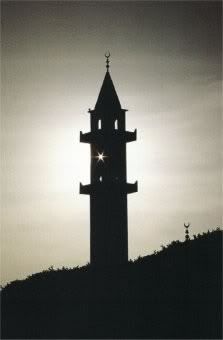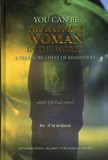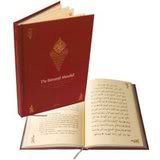Dhikr
Dhikr of the eyes, which consists in weeping
Dhikr of the ears, which consists in listening
Dhikr of the tongue, which consists in praise
Dhikr of the hands, which consists in giving
Dhikr of the body, which consists in loyalty
Dhikr of the heart, which consists in fear and hope
Dhikr of the spirit, which consists of utter submission and acceptance.
Aashiq-E-Mustapha
Dhikr (or Zikr) is the remembrance and glorification of Allah in order to become closer to Him. Dhikr can be done either silently in your heart, or audibly with a group of people, asking for forgiveness or praising the greatness of Allah.
If we look at our everyday lives we all, in some way or another, participate in Dhikr. Whether it is through a conscious effort after salah, or just at times of distress or happiness – we all feel the need to remember Allah. Dhikr is a form of worship that carries much reward.
Abu Hurairah reported that Allah's Messenger (may peace be upon him) said:
“Allah, the Exalted and Glorious stated: I am near to the thought of My servant as he thinks about Me, and I am with him as he remembers Me. And if he remembers Me in his heart, I also remember him in My Heart, and if he remembers Me in assembly I remember him in assembly, better than his (remembrance), and if he draws near Me by the span of a palm, I draw near him by a cubit, and if he draws near Me by a cubit I draw near him by the space (covered by) two arms. And if he walks towards Me, I rush towards him.”
(Hadith from Sahih Muslim & Bukhari)
Supplication (dua) is not only the continuous outpouring of a person’s heart before their Lord, but it is also an expression of their sense of nearness to Allah. We acknowledge the might and power of Allah as well as the grace and blessings we are given. If we could conceive how much a person supplicates, what he supplicates for, and the way that he supplicates, then we could start to understand how much love they have for Allah in their soul.
By increasing our remembrance of Allah, we can increase the amount of reward we obtain. Dhikr does not have to be organised, or complicated. It is something which can be done quickly, and if done with sincerity of the heart it can have a huge positive effect.
"Truly Allah leaves to stray whom He wills; but He guides to Himself those who turn to Him in penitence. Those who believe and whose hearts find satisfaction in the remembrance of Allah: for without doubt in the remembrance of Allah do hearts find satisfaction.”
13: 27-28 The Holy Qur’an
“Bring your Rabb to remembrance deep in your soul with humility and in reverence without raising your voice, both in the mornings and in the evenings; and be not of those who are heedless.”
7:205 The Holy Qur’an
Those who remember Allah while standing, sitting, and lying on their sides, and meditate on the creation of the heavens and the earth. Then cry out:" Our Rabb! You have not created this in vain. Glory to You! Save us from the punishment of Fire.”
3:191 The Holy Qur’an
Whatever we are doing, we can always remember and praise Allah, and if done with sincerity and yearning, there is nothing but benefit and the drawing of nearness to Allah.
Dhikr of the ears, which consists in listening
Dhikr of the tongue, which consists in praise
Dhikr of the hands, which consists in giving
Dhikr of the body, which consists in loyalty
Dhikr of the heart, which consists in fear and hope
Dhikr of the spirit, which consists of utter submission and acceptance.
Aashiq-E-Mustapha
Dhikr (or Zikr) is the remembrance and glorification of Allah in order to become closer to Him. Dhikr can be done either silently in your heart, or audibly with a group of people, asking for forgiveness or praising the greatness of Allah.
If we look at our everyday lives we all, in some way or another, participate in Dhikr. Whether it is through a conscious effort after salah, or just at times of distress or happiness – we all feel the need to remember Allah. Dhikr is a form of worship that carries much reward.
Abu Hurairah reported that Allah's Messenger (may peace be upon him) said:
“Allah, the Exalted and Glorious stated: I am near to the thought of My servant as he thinks about Me, and I am with him as he remembers Me. And if he remembers Me in his heart, I also remember him in My Heart, and if he remembers Me in assembly I remember him in assembly, better than his (remembrance), and if he draws near Me by the span of a palm, I draw near him by a cubit, and if he draws near Me by a cubit I draw near him by the space (covered by) two arms. And if he walks towards Me, I rush towards him.”
(Hadith from Sahih Muslim & Bukhari)
Supplication (dua) is not only the continuous outpouring of a person’s heart before their Lord, but it is also an expression of their sense of nearness to Allah. We acknowledge the might and power of Allah as well as the grace and blessings we are given. If we could conceive how much a person supplicates, what he supplicates for, and the way that he supplicates, then we could start to understand how much love they have for Allah in their soul.
By increasing our remembrance of Allah, we can increase the amount of reward we obtain. Dhikr does not have to be organised, or complicated. It is something which can be done quickly, and if done with sincerity of the heart it can have a huge positive effect.
"Truly Allah leaves to stray whom He wills; but He guides to Himself those who turn to Him in penitence. Those who believe and whose hearts find satisfaction in the remembrance of Allah: for without doubt in the remembrance of Allah do hearts find satisfaction.”
13: 27-28 The Holy Qur’an
“Bring your Rabb to remembrance deep in your soul with humility and in reverence without raising your voice, both in the mornings and in the evenings; and be not of those who are heedless.”
7:205 The Holy Qur’an
Those who remember Allah while standing, sitting, and lying on their sides, and meditate on the creation of the heavens and the earth. Then cry out:" Our Rabb! You have not created this in vain. Glory to You! Save us from the punishment of Fire.”
3:191 The Holy Qur’an
Whatever we are doing, we can always remember and praise Allah, and if done with sincerity and yearning, there is nothing but benefit and the drawing of nearness to Allah.
Labels: Allah, dhikr, Qur'an, rememberence, reminders





